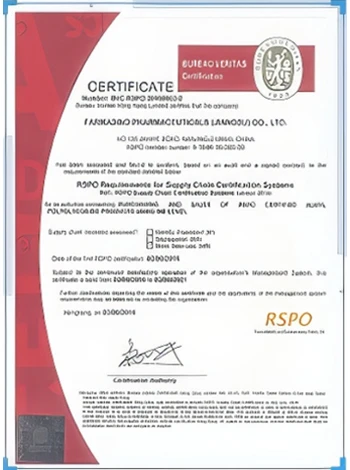



Solubility of Barium Sulfate in Aqueous Solutions and Its Implications
Understanding the Solubility of Barium Sulfate in Water
Barium sulfate (BaSO₄) is an inorganic compound that is widely known for its unique properties and applications, particularly in the fields of medicine, industry, and environmental science. One of its most notable characteristics is its very low solubility in water, which raises questions about its behavior in various chemical and physical contexts. This article explores the solubility of barium sulfate in water, the factors affecting it, and its implications for different applications.
Low Solubility of Barium Sulfate
Barium sulfate's solubility in water is often quoted as being extremely low, typically around 0.000244 grams per liter at room temperature (25°C). This low solubility categorizes it as a sparingly soluble salt. The limited solubility can be attributed to the strong ionic bonds between barium ions (Ba²⁺) and sulfate ions (SO₄²⁻) in the crystal lattice, which are energetically favorable and resist dissociation in aqueous solutions.
This characteristic is particularly prominent in comparison to other sulfate salts, such as sodium sulfate or potassium sulfate, which are highly soluble. The low solubility of barium sulfate makes it interesting from both scientific and practical standpoints.
Factors Influencing Solubility
Several factors affect the solubility of barium sulfate in water. Temperature is one of the most significant variables; generally, increasing the temperature leads to an increase in solubility for many salts. However, for barium sulfate, the relationship can be complex and is often not straightforward. While solubility might slightly increase with temperature, the overall effect is minimal due to the strong enthalpic interactions in the solid state.
Another important factor is the ionic strength of the solution. Adding other salts can affect the solubility of barium sulfate through a phenomenon known as the common ion effect. For example, if a solution already contains sulfate ions, the solubility of barium sulfate will decrease further due to the shift in equilibrium according to Le Chatelier's principle.
barium sulfate solubility in water

Additionally, pH can influence solubility. While barium sulfate is not significantly affected by variations in pH under normal conditions, the presence of complexing agents or chelating agents in the solution could lead to increased solubility by forming soluble barium complexes.
Practical Implications
The low solubility of barium sulfate has several important practical applications. One of the most critical uses is in the medical field, where it serves as a contrast agent for X-ray imaging of the gastrointestinal tract. By ingesting a barium sulfate suspension, physicians can obtain clearer images, as the compound outlines the structure of the digestive organs due to its opacity to X-rays.
In industrial applications, barium sulfate is used as a pigment in paints, coatings, and plastics. It provides brightness and durability, making it a valuable additive in various products. Furthermore, the low solubility reduces the risk of leaching into the environment, making it a favorable option for many applications.
On the environmental front, the low solubility of barium sulfate also plays a role in waste management. In cases where barium is released into aquatic systems, its low solubility minimizes the risks of bioaccumulation and toxicity in aquatic organisms.
Conclusion
In summary, the solubility of barium sulfate in water is a topic rich with implications across various fields. Its sparingly soluble nature makes it a useful compound in medical imaging, industrial applications, and environmental safety. Understanding the factors that influence its solubility can help in the effective utilization and management of barium sulfate in practical scenarios, ensuring that its benefits are maximized while minimizing any potential risks associated with its use. Thus, barium sulfate remains a compound of interest for researchers, engineers, and healthcare professionals alike, highlighting the importance of solubility in application and safety.
-
Why Sodium Persulfate Is Everywhere NowNewsJul.07,2025
-
Why Polyacrylamide Is in High DemandNewsJul.07,2025
-
Understanding Paint Chemicals and Their ApplicationsNewsJul.07,2025
-
Smart Use Of Mining ChemicalsNewsJul.07,2025
-
Practical Uses of Potassium MonopersulfateNewsJul.07,2025
-
Agrochemicals In Real FarmingNewsJul.07,2025
-
Sodium Chlorite Hot UsesNewsJul.01,2025










